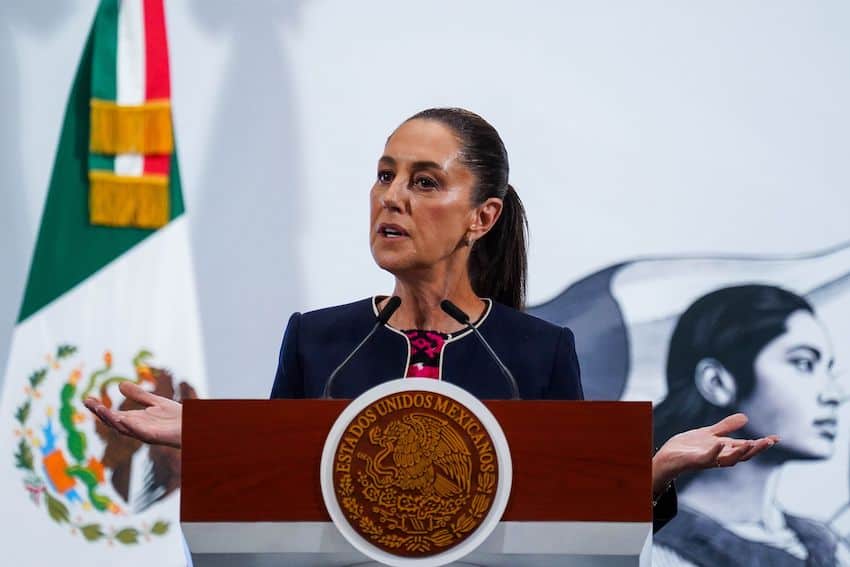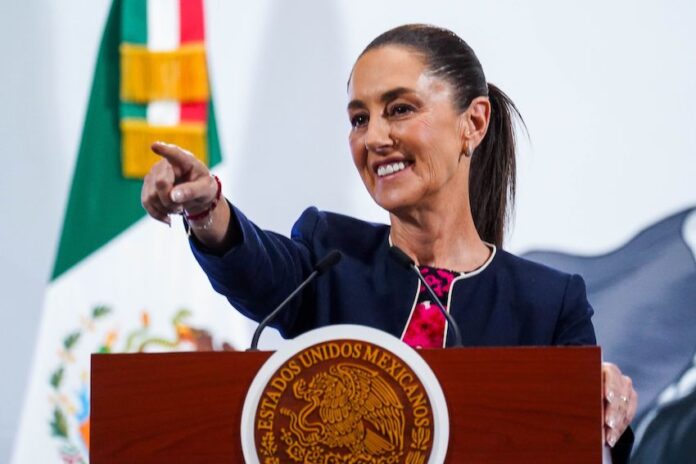At her Tuesday morning press conference, President Claudia Sheinbaum responded to a question about the recent spate of violence in Baja California Sur.
She also spoke about her government’s dealings with its U.S. counterpart during the first 100 days of Donald Trump’s second term as president and gave reporters an update on the number of deportees that the Trump administration has sent to Mexico since taking office on Jan. 20.
Is it safe to visit Baja California Sur after the outbreak of violence last week? Sheinbaum says it is
A reporter raised concerns about violence in Baja California Sur after two soldiers and a high-ranking law enforcement official were killed in the state last week and passenger buses were set on fire in Los Cabos, the state’s premier tourist destination.
The governments of Canada and the United States issued security alerts for travelers to Los Cabos and the state capital, La Paz, following the violent incidents.
Sheinbaum reminded reporters that “very important arrests” have been made in the state, a reference to the arrest in Los Cabos late last week of four men who allegedly set the buses on fire as well as the detention in La Paz of seven other people allegedly “linked to a criminal group” and allegedly responsible for killing Ulises Omar Cota Montaño, a state criminal investigation commander.
Among the seven people arrested in La Paz was a man identified as Marcos “N,” allegedly a leader in Baja California Sur of the “Los Mayos” faction of the Sinaloa Cartel.
US, Canada issue security alert for Los Cabos and La Paz, BCS
The four men arrested in Los Cabos, all aged in their 20s, were taken into custody at a home in the tourist destination after they attempted to repel state and federal security forces with gunfire, the federal Security Ministry said. Authorities seized seven firearms and weapon paraphernalia at the address.
Sheinbaum said that the arrests in Baja California would “help” the security situation “a lot” in Baja California Sur, which has been one of the least violent states in Mexico in recent years after high levels of violence plagued the state late last decade.
“You can go to visit Baja California Sur,” the president declared.
“Los Cabos, in particular, which is a tourism destination par excellence,” she added.
Sheinbaum highlights helpful ‘mechanisms of communication’ with Trump
Trump marked 100 days in office on Tuesday with a speech in Michigan. During this period, the U.S. president imposed tariffs on Mexican steel, aluminum and cars as well as other goods not covered by the USMCA free trade pact. He made some changes to his auto tariffs on Tuesday.
On Tuesday morning, a reporter asked Sheinbaum to give an assessment of the first 100 days of Trump’s second term, a period during which she spoke to the U.S. president on three occasions about tariffs and other issues including flows of migrants and narcotics to the U.S. from Mexico.

“I believe that we’ve established mechanisms of communication with President Trump that have helped us and which continue to allow us to speak to and communicate with the United States government,” she said.
Sheinbaum specifically mentioned communication channels that have been established between Economy Minister Marcelo Ebrard and his counterpart Commerce Secretary Howard Lutnick, and between Finance Minister Edgar Amador Zamora and Treasury Secretary Scott Bessent.
She added that Agriculture Minister Julio Berdegué has “very good communication” with Agriculture Secretary Brooke Rollins, who recently wrote to Berdegué to warn that imports of Mexican cattle could once again be restricted if Mexico doesn’t take additional steps to combat the New World screwworm.
On the screwworm issue, a “basic agreement” with the United States has been reached, Sheinbaum said.
She acknowledged that there are still tariff issues to resolve — Ebrard said in early April that he expected trade negotiations with the U.S. to last 40 days — but stressed that “we are still in communication and hope to reach better agreements.”
Fewer than 40,000 people deported to Mexico since Trump took office
Sheinbaum said that 38,757 people have been deported to Mexico since Trump began his second term on Jan. 20. Of that number, 33,311 are Mexican and 5,446 are foreigners, she said.
Asked why Mexico is accepting people who aren’t Mexican, Sheinbaum cited “humanitarian reasons.”
She said that her government hasn’t signed any agreement with the United States to accept non-Mexican deportees.
Sheinbaum also said that “fewer and fewer people of other nationalities are arriving” in Mexico because the United States government has agreements “with practically all countries,” meaning that it can directly send the majority of deportees to their original homelands.
In addition to sending some non-Mexican deportees to Mexico, the U.S. has deported non-Salvadoran nationals to El Salvador and non-Panamanian nationals to Panama.
Sheinbaum said that the Mexican government “can offer some options” to foreign deportees, such as assistance finding work in Mexico, but if they want to return to their countries of origin they are assisted to do so.
“The majority want to return to their country,” she said.
By Mexico News Daily chief staff writer Peter Davies ([email protected])
